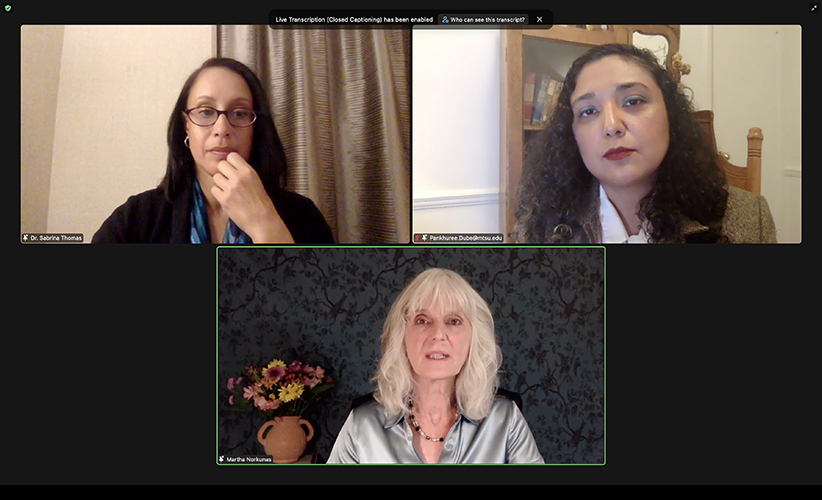After World War II, good-hearted Americans mounted media campaigns to bring the biracial children left behind by Black GIs in Germany home to the States, believing their fathers’ country would “be more congenial” to the “brown babies” than their mothers’ post-Nazi nation.
Two decades later, a U.S. foreign policy expert says, Americans were more concerned about Black and brown men dying in disproportionate numbers in Vietnam than the mixed-race children being left behind in a land that viewed them as peasants.

Dr. Sabrina Thomas
Dr. Sabrina Thomas of Wabash College, who presented this spring’s Strickland Visiting Scholar Lecture at Middle Tennessee State University in a March 31 webinar, said in “Children and War: Race, Rights and Rescue” that Americans had starkly different reactions to the children created when U.S. soldiers fraternized with local women in Germany and those in Vietnam.
Nearly 70 years later, she pointed out, the United States still has no formal solution to help such children.
American soldiers left behind an estimated 37,000 illegitimate children in a devastated post-war Germany, including about 5,000 biracial children in orphanages.
In 1947, African American media began calling for the United States, especially middle-class Black families, to adopt the “brown babies,” creating a term of endearment to link them to their fathers, families and community in the United States.
“In this case, that naming was an assertion of transnational racial kinship intended to validate the lives of the ‘brown babies’ as part of the shared global Black experience,” said Thomas, a U.S. foreign policy expert and author of “Scars of War: The Politics of Paternity and Responsibility for the Amerasians of Vietnam,” which has been nominated for the Bancroft Book Prize.
“As African Americans in the 1950s intensified the push for civil rights in the United States, they embraced the ‘brown babies’ as Black American children, offering them a racial and national identity and a kinship network missing in Germany.”
Mabel Treadwell Grammer, a journalist, civil rights activist and military wife, saw the children’s plight firsthand when she visited orphanages while her husband was stationed in Mannheim, Germany, beginning in 1950.
She dove into the international adoption effort, helping with the national publicity and ultimately finding homes for 500 children and adopting another 12 with her husband. Thousands more found American homes with others’ help.
‘They would ostracize them’
By the 1960s, America was embroiled in the conflict in Vietnam, and U.S. soldiers were once again socializing, and more, with the locals. The children born from those relationships were in a country and culture where lighter skin was prized and dark skin marked a person as a peasant, unworthy of an education, job or respect, Thomas said.
Disturbed by reports of drug abuse among and discrimination against African American soldiers, the NAACP sent its then-president, Hosea Williams, and his wife, Juanita, to South Vietnam in 1971.
 While Hosea Williams visited base camps, military prisons and other U.S. facilities, Juanita Williams toured orphanages.
While Hosea Williams visited base camps, military prisons and other U.S. facilities, Juanita Williams toured orphanages.
“When a baby was born black, they would not want these babies,” Juanita Williams told a reporter. “They would ostracize them.”
“Even more disturbing for Juanita was her understanding,” Thomas added, “that in the best cases, the enemy’s mothers would abandon their Black Amerasian babies in the hospitals, and in the worst, the babies were found in garbage cans, on the streets and left outside the gates of orphans’ homes.”
Juanita Williams immediately began to act with the same good intent as her fellow citizens in the 1940s and 1950s, working toward establishing an orphanage for the Black Amerasian babies and arranging for their adoption by African American families.
Her efforts failed.
“The outcry of African Americans to the idea of Nazis victimizing Black children in Germany was absent for the Black Amerasians who reportedly faced similar threats of racial violence from the North Vietnamese communists,” the professor said.
“African Americans resented the assertions by U.S. leaders and humanitarians, and by the Williamses, that they were responsible for the Black Amerasians when other groups of Americans were not accountable for their abandoned children. Specifically, African Americans rejected the accusation that America’s badly behaving soldiers in Vietnam were always Black.”
There also was no organized African American media effort, or by the African American community in general, to help or adopt the biracial children of Vietnam like the “brown babies” of Germany.
“Black leaders and the Black press remained largely silent on the issue, as they were more concerned at the time about the disproportionate number of African American men dying in Vietnam and the conservative pushback to the advances of the civil rights movement wreaking havoc on Black leadership, Black communities and Black progress,” Thomas said.

Guest speaker Dr. Sabrina Thomas of Wabash College, shown at upper left, who presented this spring’s Strickland Visiting Scholar Lecture at Middle Tennessee State University on March 31, listens with moderator Dr. Pankhuree Dube, right, an assistant professor of history at MTSU, as Dr. Martha Norkunas speaks during the Zoom webinar. Norkunas, a professor of oral and public history in the Department of History’s Public History Program, coordinates the Strickland lecture program. (MTSU screenshot via Zoom)
Some of those Black Amerasians made their way to the United States as teenagers and adults to find a sense of community, she added. Others remain in the land of their birth, now middle-aged, many impoverished and illiterate.
The “brown babies” of Germany have created communities of support and information through their shared history in the ensuing years, using records to connect and “to write their voice into the history, into the narrative,” Thomas said.
No policy changes to help
Unfortunately, she added, what has not resulted from any U.S. war is “any change in U.S. military arbitration policy that would force U.S. soldiers and the U.S. government to take responsibility for these children, through financial support or fraternal legitimacy.”
As a result, Thomas said, “global conflicts, including the current one in Ukraine, will continue to include transnational debates over children, their rights, responsibility and rescue.”
Thomas is the current David A. Moore Chair of American History and an associate professor at the Crawfordsville, Indiana, private liberal arts college since 2015. She earned her doctorate in history from Arizona State University after spending a year at MTSU as a Dissertation Completion Fellow.
Her new project, boosted with a 2021 National Endowment for the Humanities’ Summer Stipend Award, is “The Soul of Blood and Borders,” a book on how African Americans responded to biracial children born in the wake of WWII and the Vietnam War.
MTSU’s Department of History in the College of Liberal Arts sponsors the twice-yearly Strickland Lecture series. The Strickland Visiting Scholar Program helps MTSU students meet with renowned scholars whose expertise spans a variety of historical issues.
The Strickland family established the program in memory of Roscoe Lee Strickland Jr., a longtime professor of European history at MTSU and the first president of the university’s Faculty Senate.
For more information about this lecture, please contact MTSU’s Department of History at 615-898-5798 or visit www.mtsu.edu/history/strickland-scholar.php.
— Gina E. Fann (gina.fann@mtsu.edu)

Foreign policy expert focuses on America’s biracial ‘war babies’ in MTSU’s free webinar
March 18, 2022
A U.S. foreign policy expert and historian will focus on the smallest faces of America’s wars Thursday, March 31, when she talks with a Middle Tennessee State University audience online at this spring’s Strickland Visiting Scholar Lecture.

Dr. Sabrina Thomas
Professor Sabrina Thomas of Wabash College will speak on “Children and War: Race, Rights and Rescue” in a Zoom webinar beginning at 7 p.m. Central on March 31.
Participants can join the free 90-minute webinar, which will be closed-captioned, at https://mtsu.zoom.us/j/83778897614. No password will be required.
Thomas, the current David A. Moore Chair of American History and an associate professor at the Crawfordsville, Indiana, private liberal arts college since 2015, earned her doctorate in history from Arizona State University after spending a year at MTSU as a Dissertation Completion Fellow.
Her foreign policy expertise focuses on how race, gender, nation and war meet in the legacies of children born from international conflicts. Her most recent book, “Scars of War: The Politics of Paternity and Responsibility for the Amerasians of Vietnam,” has been nominated for the Bancroft Book Prize.
Debates on U.S. military interventions in international conflicts have been intertwined for decades with how children, as victims, agents and byproducts of war, fit into the narratives of race, rights and rescue central to U.S. foreign relations and immigration and refugee policy.
In her MTSU talk, Thomas will compare the U.S. response to Germany’s “brown babies” — the children of African American servicemen and white German women born after Germany’s defeat in World War II — and the Black Amerasians of Vietnam, who are the children of African American servicemen and Vietnamese women conceived during the Vietnam War.
Thomas’ extensive research efforts were boosted with a 2021 National Endowment for the Humanities’ Summer Stipend Award, providing support for her new project, “The Soul of Blood and Borders,” a book on how African Americans responded to biracial children born in the wake of WWII and the Vietnam War.
 “It looks at the effects that war has on real people’s lives,” Thomas said in discussing her new book. “One of the most important effects is the birth of children.
“It looks at the effects that war has on real people’s lives,” Thomas said in discussing her new book. “One of the most important effects is the birth of children.
“It’s my assumption that what I’m going to find is that the ways the Black community responded to these kids was really reflective of American race relations at the time. I think it’s really important and relevant to get the voices of the Black community into this story.”
MTSU’s Department of History in the College of Liberal Arts sponsors the twice-yearly Strickland Lecture series. The Strickland Visiting Scholar Program helps MTSU students meet with renowned scholars whose expertise spans a variety of historical issues.
The Strickland family established the program in memory of Roscoe Lee Strickland Jr., a longtime professor of European history at MTSU and the first president of the university’s Faculty Senate.
For more information about this lecture, please contact MTSU’s Department of History at 615-898-5798 or visit www.mtsu.edu/history/strickland-scholar.php.
— Gina E. Fann (gina.fann@mtsu.edu)



COMMENTS ARE OFF THIS POST